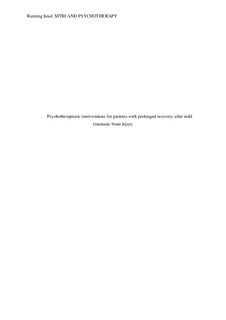| dc.description.abstract | The objective of this thesis was to do a systematic review of the literature on psychotherapeutic interventions for patients suffering from prolonged recovery after mild traumatic brain injury (MTBI). Prolonged recovery was defined as symptoms persisting three months after injury.
We conducted an extensive literature search of the databases Embase, MedLine, PsycInfo, CINAHL and SPORTDiscus. The search yielded 1925 hits, whereof 3 were considered to fulfil our criteria. Despite several earlier literature reviews pointing out the lack of methodically strong studies exploring the effect of psychotherapy after MTBI, such studies are still sparse. 3 studies were chosen for a thorough review, employing different interventions and outcome measures. In addition, 3 studies examining possible risk factor for and prevention of persistent symptoms were considered.
Results from the main review suggested that computer-based interventions and mindfulness-based techniques, as well as cognitive-behavioural therapy in combination with cognitive remediation can all have positive effects on persistent symptoms after MTBI. The studies that looked at risk factors and prevention suggested that patients with a history of psychiatric illness is a subgroup of MTBI patients that seem to benefit from individualised treatment including psychotherapy. The construct of illness perceptions, how one interprets ones symptoms, might also help predict which patients might be in need of, and benefit from, psychotherapy.
Treatment studies for patients with prolonged recovery after MTBI yielded results not easily comparable, due to employing different modes of treatment. Overall, the empirical support for psychological treatments of persistent symptoms following MTBI is not unanimous. Some of the studies indicated that interventions should be aimed specifically at patients thought to be especially at risk for prolonged recovery. However, the field demonstrates a reluctance to adhere to recommendations made on the basis of previous research and systematic reviews. | nb_NO |
